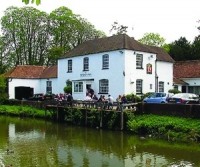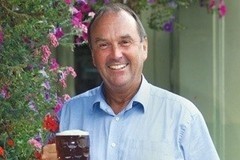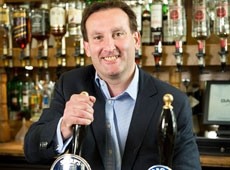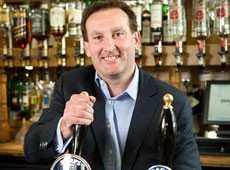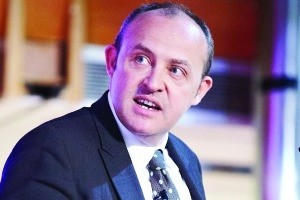The Big Interview: David Bruce, City Pub Company
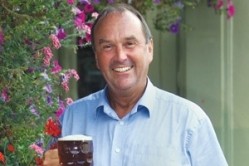
Bruce is extraordinarily amused by this. “Can you believe what we’re doing?” he chortles. I am worrying about lead poisoning. Or electrocution. Or that a spoon might slip and First Great Western will be brought to a shuddering halt by a small drop of custard.
Meeting David Bruce for lunch is a hazardous business. You never know where you might end up. Or where you might start.
That morning we had already stood in a field of freshly-cropped asparagus, inspected budding vineyards, surveyed potential ‘glamping’ sites, met butchers, bakers, fishmongers and florists, and hungrily scoffed bacon baps.
We’d been on a short canal trip with disabled children, clambered across barges and laughed at ducks. We had even found some time to talk about pubs.
This, then, is the wonderful world of Bruce. At least the part within a few miles’ radius of his west Berkshire home where he seems to know everyone, a ball of energy, ideas, puns and free association, bouncing about from this to that and being equally enthusiastic about everything, an exclamation mark at the end of every sentence.
Bruce is the purest form of entrepreneur. The wild kind that might scare off prudent investors. Except that his business track record is now proving irresistible.
His latest venture, or rather ventures, City Pub Company (East) and City Pub Company (West), are set up under an Enterprise Investment Scheme (EIS) that, within eight weeks, was four times over-subscribed beyond the EIS £4m limit.
“And that’s in a double-dip recession,” he laughs. “It’s hilarious! We had to send people their money back! I call this kind of funding OPM — other people’s money. And we don’t let people down.”
When he sold his previous pubco, Capital Pub Company, to Greene King last year, investors made a three-fold tax-free capital gain.
“Yet when we started a top banker said to me it wouldn’t make any money and there were no freeholds to buy. We finished up with 35 freehold pubs and sold them for £93m. It was a brilliant exit. I love start-ups. I love proving people wrong.”
As he did with the business that made his name. The Firkin brew-pub chain, started in the late 1970s, was a revelation. It was radically new, but somehow harked back to a lost, perhaps mythical, tradition of rumbustious beer halls.
Bruce not only reinvented the brew-pub, he revived the pub piano, the singalong, and allowed revellers to dance on the long benches — but never on the tables. They were always packed.
“By 1988, when we sold up, we were spending £100,000 a year on pub pianists,” he declares, astonishing himself once more. “But when top analysts saw the Firkin business plan they said it was too chancy. Their advice to investors was ‘abandon’. And then it became the largest retail brand in Allied Domecq.”
Significantly, the new owner was unable to sustain its success. “Allied formalised the concept. It missed the point. We had created a niche, a select market. Under Allied everything became a Firkin. Then they tried to embellish it.”
But the Firkins had already shown other operators what could be done. “I had no idea they would be part of a revolution. We just stumbled on the idea, really. We knew we were taking on the big brewers, that their pubs were crap, that their beer was crap, that we could do better.”
After selling up, Bruce travelled the world advising brewery start-ups, playing no small part in the beginnings of today’s burgeoning microbrewery industry. With the cash he’d made he also established the Bruce Trust, a charity to take disabled children and their carers on barge holidays.
Even with this, he had to do battle with the doubters.
“The Charity Commission thought it was a tax scam of some sort. It took a year of campaigning to persuade it otherwise.
“Now we have four boats, and over the past 23 years we’ve given 13,500 people a holiday. And we’re building the first motorhome for disabled people. None of that would have been possible without the Firkins.”
And neither would Bruce’s current business interests. The Country Food & Dining company, which formed in 2006, comprises half-a-dozen farm shops combined with family restaurants, of which Cobbs Farm — 53 acres outside Hungerford, Berkshire — is the flagship.
As well as the bounteous produce grown in the fields around, local entrepreneurial specialists have concessions on site to provide what Bruce hopes adds up to “compelling” competition for supermarkets.
He is also experimenting with a vineyard project.
“It’s very interesting. There aren’t enough English grapes being grown to satisfy the English wine brands. We’ve spent £50,000 on the opportunity so far. There’s only five acres now, but we may have 20 next year.”
In addition, he is in one of his battles with the authorities over putting in a ‘glamping’ site — that’s glamorous camping.
“The business has evolved into something quite complex,” he says.
And since last year he has returned to the pub industry. As non-executive chairman of City Pub Company he resumes his partnership with the co-founder of Capital, Clive Watson, who is CEO, and has brought in former Fuller’s man John Roberts as non-executive director to add some corporate experience.
“I like working with people I like. Clive and I have an unusual marriage and it has its ups and downs, but we’re lucky to have found each other,” he says.
Six pubs have opened, or are in the process of opening. They include the £2.7m Cork in Bath; the Mill in Cambridge, unusually for Bruce, a leasehold; the Church Street Townhouse in Stratford-upon-Avon, Warwickshire, with a dozen letting rooms; and the old police station in Henley, Oxfordshire, which will incorporate a microbrewery.
He admits it’s getting harder to succeed as standards have risen across the industry, but he’s sticking with the culture that’s worked for him, a culture someone once described as “a professional standard of amateurism”.
“That’s what pervades the business, and that’s what’s brought success,” insists Bruce. “Peter Salussolia (a former colleague, now boss of Glendola) said I was the worst area manager in the business — but at least no-one could call me a stuffed shirt.
“It’s a style of leadership Clive and I have. We don’t wear suits because immediately that generates an oppressive formality.
“We also allow pub managers to run their particular business. All the pubs in Capital were totally different in order to suit their local market. To their communities they were independent freehouses.
“In-house training was designed to motivate the spirit of entrepreneurialism in managers, and they had bonuses and share options. Some took £100,000 in share options. That gives you loyalty, long service.
“We would never tell someone what to do. We would ask a manager ‘what about this?’, ‘shall we do that?’ And then discuss it. It gave them ownership. They had all the fun of running their own business without the capital outlay.”
And now, Bruce says, almost as if he has no control over it, “we seem to be doing it again”.
“I have thought of stepping back, but I would rather be out in the field,” he says. “I always need a fight. I couldn’t do anything else really. I remain unemployable.”
My kind of pub
“I like pubs such as the Dundas Arms at Kintbury, Berkshire, where I imagine spending my twilight years — a freehouse that sells local microbrewery beers and home-made food — and I mean home-made. There’s also a railway station so you don’t have to drink and drive.
“The ambience is important, too. It has a cosy naturalness that has evolved over the years. I don’t want a pub to look like it’s been designed.”
Key dates
1966
David Bruce begins his career as a brewer for Courage and Theakston
1972
Moves to licensed retail with disco pub operator Charram
1979
Establishes the Firkin chain of brew-pubs as Bruce’s Brewery (now Brew Securities)
1988
Sells Firkins to Allied Domecq. Becomes consultant and investor for start-up brewers around the world
1989
Forms the Bruce Trust
1993
Joins Grosvenor Inns as marketing and development director, rolling out the Slug & Lettuce brand
1998
A joint venture with Brakspear Brewery creates managed pubco Honeypot Inns
2000
Bought out by Brakspear. Starts Capital Pub Company with Clive Watson
2006
Forms Country Food & Dining company, currently operating six farm shops with restaurants
2011
Launches City Pub Company. Becomes president of Kennet & Avon Canal Trust
